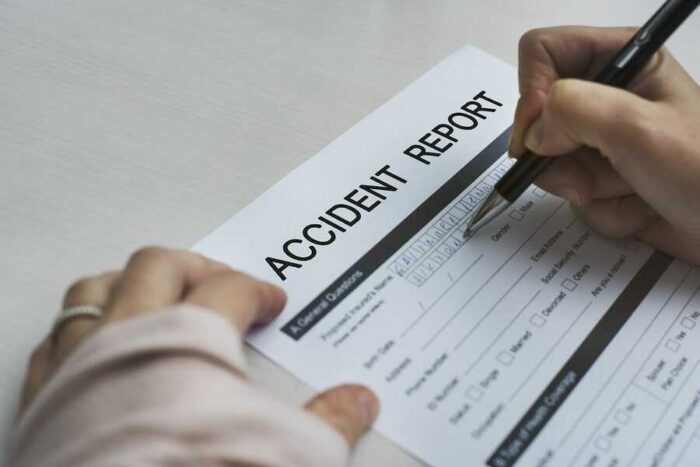
In personal injury compensation, figuring out how damages are calculated involves understanding important factors and specific formulas. The main concept is liability, which includes Duty, Breach of Duty, and the Actions that caused the injury. This article looks at the important elements of liability and the role your attorney plays in proving liability, especially in cases with multiple parties.
We’ll explore the complexities of personal injury compensation and the connection between legal elements and seeking justice. Understanding these factors and formulas is crucial for anyone seeking fair compensation for their injuries.

Documenting Injuries and Damage
After a personal injury, it’s important to carefully document your injuries and damages to make sure you get the compensation you deserve. To build a strong case, you need to gather important documents. Start by getting the official Police Reports, which give a detailed account of what happened. Take Photos to show the scene, your injuries, and any damage. Witness Statements are also important because they provide different perspectives. Doctor Records show the extent of your injuries and your treatment plan. Repair Bills for any damaged property help support your financial claim. This evidence is really important because it proves your financial claims and makes your case stronger. As you start the process of seeking compensation, keep these things in mind.
Listing and Categorizing Claims
After an accident, it’s important to list and categorize your claims to make sure you can ask for compensation properly. First, make a detailed list of your accident-related expenses, like medical costs for treatments and medications. Also, include property damage costs for fixing or replacing your things. Don’t forget to consider the income you lost during your recovery and any future income you might miss out on because of long-term effects.
It’s important to understand the difference between Economic Damages and Non-Economic Damages. Economic Damages include medical costs and lost earnings, which are tangible financial losses with clear monetary values. Non-Economic Damages include intangible losses like pain and suffering, emotional distress, and the impact on your overall quality of life. Pain and suffering should be evaluated and quantified separately because it plays a significant role in your overall claim and is subjective.
Carefully list and categorize your claims. This will show the financial impact and help you negotiate fair compensation for the hardships you’ve experienced.

Punitive Damages – Addressing Negligence or Deliberate Harm
In personal injury cases, punitive damages are important when dealing with negligence or intentional harm. It’s crucial to identify when punitive damages are needed, especially when recklessness or deliberate actions have made the harm worse. In these cases, it’s important to consider negotiating extra payments beyond standard compensatory damages.
If you don’t want to negotiate, you might need to go to court to get punitive damages. This means a jury will decide how much money the person who caused harm should pay as a punishment. Punitive damages are important because they not only punish the wrongdoer financially but also discourage them from doing the same thing again. Knowing when and how to ask for punitive damages can be complicated, so it’s important to have a good lawyer to help you through the process.
Calculating Damage Claims – Understanding the Multiplier Effect
Understanding the multiplier effect is very important when calculating damage claims in personal injury cases. The multiplier is used to estimate intangible losses based on tangible financial losses. It reflects the seriousness of non-economic factors like pain and suffering, emotional distress, and the overall impact on quality of life.
In states with comparative negligence, the injured person’s responsibility affects the compensation. The final amount of compensation is adjusted based on the fault of each party. This calculation makes sure that damages are distributed fairly when multiple parties are involved. Understanding reduction factors is important for creating a compensation claim that reflects the case accurately. Legal expertise is crucial for navigating this process.

Compensation Calculation – Formula and Considerations
In personal injury cases, compensation is calculated by multiplying economic damages by a factor between 1.5 and 5 to estimate non-economic damages. Non-economic damages include intangible losses like pain and suffering, emotional distress, and the overall impact on one’s quality of life.
This formula considers how bad the injuries are, the claims for pain and suffering, and future medical needs. The seriousness of the injuries and how long they affect you are important in deciding the multiplier. This calculation makes sure that the compensation matches the situation, giving fair payment for the difficulties the injured person faced. To do this right, you need legal knowledge to use the formula correctly and improve the chances of getting the right compensation.
Taking the Next Steps – Settlement, Mediation, or Legal Proceedings
After you’ve put together your personal injury compensation claim, the next important steps are to work with your Car Accident Lawyers Gold Coast to find ways to resolve the issue. Starting negotiations, mediation, or arbitration can help you reach an agreement without going to court. Your lawyer will guide you through these processes and use their expertise to get a good result.
If you can’t agree on a settlement, it’s important to get ready for a trial. Your Car Accident Lawyers on the Gold Coast will help you prepare for legal proceedings. They’ll give you legal advice and strategies to increase your chances of getting the compensation you deserve, whether through negotiation, mediation, or a trial.

Conclusion – A Strategic Approach to Personal Injury Compensation
In conclusion, getting compensation for personal injury needs careful planning and teamwork with your trusted Car Accident Lawyers on the Gold Coast. Settlement negotiations, mediation, or legal proceedings need a strategic approach. Working closely with your attorney helps you handle these challenges and consider every aspect of your case.
Strategic planning is essential for a successful personal injury claim. Each step of the process is connected and needs a thorough understanding. Whether getting ready for negotiations, mediation, or legal action, a carefully planned strategy, made with your legal team, is crucial. The main focus is on using a strategic approach and expert advice to improve your chances of getting fair compensation for your injuries.
















